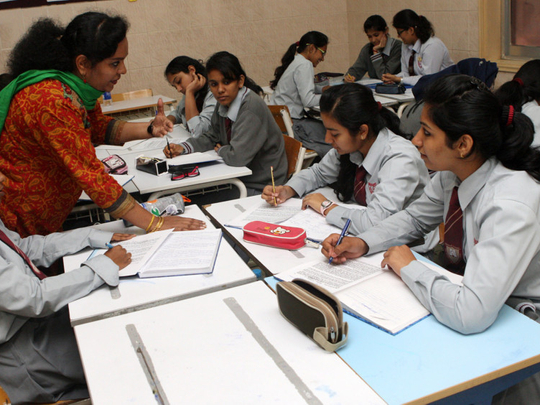
Dubai: UAE schools affiliated to India’s Central Board of Secondary Education (CBSE) are awaiting official notification from the board amid confusing reports about Hindi being made a compulsory subject till grade 10.
Recent media reports said that an Indian parliamentary committee’s proposal to make Hindi, the national language of India, a compulsory subject in schools affiliated to the CBSE has received the Indian president’s nod. Some reports also said that the recommendation will be implemented in eight north Indian states and union territories classified as Region ‘A’ states.
Last year, the CBSE had suggested an expansion of the three-language formula — English and any two Indian languages — to classes ninth and tenth from 2020. It has been kept on hold since the Ministry of Human Resource Development is yet to make a decision on this suggestion.
With the new development, parents and educators in the UAE are uncertain about the decision regarding students in the Gulf region where students learn English and Arabic as compulsory languages in these grades.
Thousands of children, who do not wish to opt for Hindi as their third language, choose languages like French, Malayalam, Urdu or Spanish.
Schools have decided to wait for an official confirmation in this regard, educators said.
“There is no circular or official notification from the CBSE as yet. So, we are waiting for an official communication,” said Ashok Kumar, CEO of The Indian High School.
Schools in the UAE were told not to take any action until they are directed by the CBSE when school principals raised the issue on the three-language formula expansion to a senior CBSE official during his recent visit.
“So, we hope that they are not going to bring any changes here in the Gulf countries,” said Dr. Mohammad Aslam Khan, the principal of New Indian Model School in Dubai where a large number of students learn Malayalam instead of Hindi.
“It will be difficult to implement Hindi as a mandatory subject here. If the CBSE makes Hindi compulsory, it can be only introduced as an additional language in the current scenario.”
He said the school has chosen to introduce different languages in different grades to reduce the burden on students. “Arabic starts from grade one while Malayalam and Urdu are introduced from grade 2 and Hindi from grade 3. There is also an option of taking an additional English paper when they are not opting for Malayalam or Urdu. We don’t want to burden children with too many languages.”
The current uncertainty is worrying parents. “We are confused whether to change to Hindi or stay with French,” said Shabu Majeed, whose two children study in a CBSE school in Abu Dhabi.
“If they are making any change, they should start it from grade one. It won’t be wise to start it from the middle school,” said another parent from Dubai.
However, Ashok Kumar said parents need not worry about any change in the current system in this academic year. “If at all there is any change, it will be introduced only after this academic year. The board will not make such major changes in the middle of the academic year.”












